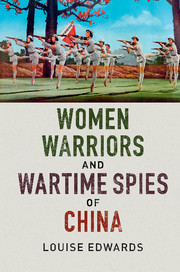Book contents
- Frontmatter
- Dedication
- Contents
- List of Figures
- Acknowledgements
- Chronology
- 1 Soldiering, war and gender in China
- 2 The archetypal woman warrior, Hua Mulan: Militarising filial piety
- 3 Qiu Jin: Transitioning from traditional swordswoman to feminist warrior
- 4 Xie Bingying opening public spaces to women Fighting patriarchy and fighting militarists
- 5 Aisin Gioro Xianyu: ‘Joan of Arc of the Orient’ or ‘Mata Hari of the East’?
- 6 Guerrilla resistance leader, Zhao Yiman: Warrior teacher and self-sacrificing CCP mother
- 7 Negotiating sexual virtue: The glamorous, honey-trap spy, Zheng Pingru
- 8 Ding Ling and Zhenzhen: Female chastity and good communist governance
- 9 Mobilising and militarising rural China through the girl martyr, Liu Hulan
- 10 Women warriors and wartime spies as tools for ‘total militarisation’: The Red Detachment of Women
- Notes
- Bibliography
- Index
10 - Women warriors and wartime spies as tools for ‘total militarisation’: The Red Detachment of Women
Published online by Cambridge University Press: 05 March 2016
- Frontmatter
- Dedication
- Contents
- List of Figures
- Acknowledgements
- Chronology
- 1 Soldiering, war and gender in China
- 2 The archetypal woman warrior, Hua Mulan: Militarising filial piety
- 3 Qiu Jin: Transitioning from traditional swordswoman to feminist warrior
- 4 Xie Bingying opening public spaces to women Fighting patriarchy and fighting militarists
- 5 Aisin Gioro Xianyu: ‘Joan of Arc of the Orient’ or ‘Mata Hari of the East’?
- 6 Guerrilla resistance leader, Zhao Yiman: Warrior teacher and self-sacrificing CCP mother
- 7 Negotiating sexual virtue: The glamorous, honey-trap spy, Zheng Pingru
- 8 Ding Ling and Zhenzhen: Female chastity and good communist governance
- 9 Mobilising and militarising rural China through the girl martyr, Liu Hulan
- 10 Women warriors and wartime spies as tools for ‘total militarisation’: The Red Detachment of Women
- Notes
- Bibliography
- Index
Summary
There is a striking omission from the story of war presented in the narratives about the Chinese woman warriors and wartime spies – the question of whether the sacrifices required of people were ‘worth it’. Jay Winter's study of European memories of the so-called Great War shows us the considerable extent to which the validity of the war project was repeatedly questioned in art, literature and film. Was all the sacrifice in vain? Were the promises of glory simply orchestrated deceit and lies? He identifies the 1914–1918 war as the point after which ‘Slowly but surely, expressions of patriotism, or inhumanly idealised images of combat, suffering, and death as “glory”, began to fade away.’ Soldiers, their families, journalists and medics queried the validity of the butchering they had just experienced. In China's twentieth and twenty-first centuries, there has never been such a point of public questioning. People may have expressed their doubts in private but the public record of art, literature, film, school texts and journalism remains mute about the possibility that any of the conflicts of the twentieth century were in vain or that those who lost their lives died in anything less than heroic glory. Those now governing the territory on which the blood of millions was spilt, the People's Republic of China (PRC), are invested in an unproblematised glorification of war. The glue that binds the nation to its communist state comprises a complex amalgam of narratives of imminent military threats to China's sovereign borders and threatened treacherous destabilisation by spies in foreign employ, as well as a sustained education about how the military weakness of the Qing court allowed foreigners and imperialists to ‘carve up China like a melon’.
Since the mid-twentieth century these stories are bound together as ‘national humiliation’. Militarisation in twentieth and twenty-first centuries’ China is encased in teaching the PRC population that it has been shamed and degraded. Chinese leaders from both the Nationalist Party and the Chinese Communist Party (CCP) teach people who could otherwise have thought of themselves as glorious survivors of foreign aggression that they have been humiliated by the military aggression of others.
- Type
- Chapter
- Information
- Women Warriors and Wartime Spies of China , pp. 198 - 206Publisher: Cambridge University PressPrint publication year: 2016



